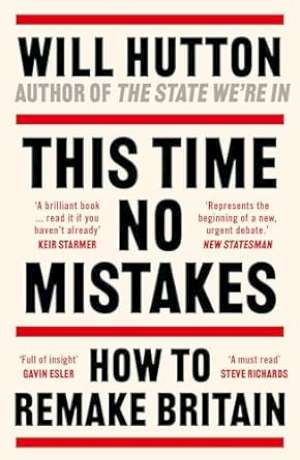03 July 2024
This Time No Mistakes
How to Remake Britain
Will Hutton
2024, Head of Zeus, 436 pages,
ISBN 9781804549377
Reviewer: Kevin Gardiner, Rothschild & Co / Cardiff Capital Region

“This is a book about a society and an economy in crisis, and how they can be changed for the better.” (p1)
Mr Hutton is a prominent journalist, and this portentous book will sell by the container load. For me, its sensationalist sectarianism is a problem, not an answer. “Perspective” is not in the index.
The first two hundred pages or so (the bulk of the text) offers an assessment of the UK’s putative predicament, and an overlong primer on modern political thought and economic history (from the Industrial Revolution to the pandemic). You will have read many similar accounts, but perhaps not such a partisan one.
Hutton largely blames the USA and Mrs Thatcher for the UK’s uniquely (in his view) unhappy state – she is twice said to be the “prime architect of … British decline” (p 26, p63), though Hutton also identifies significant policy errors made even before she was born.
At one stage Hutton does almost acknowledge some progress – “It may be that the depths of human suffering experienced during the nineteenth century have receded…” (p 227, emphasis added) – but he does not let this diminish the gloom.
Hutton accepts that his team has also occasionally played badly, notably in failing to combine “an ethic of socialism with progressive new liberalism” (p 209), and he is at pains to suggest that capitalism has its merits. But his heart is with what he calls “The We Society”.
The chapter of that name is the core of the book. Hutton is strongly in favour of good things, and very much against bad things, and suggests that for the former to prevail we just have to be cleverer and organise more collectively. He overlooks the propensity for even the cleverest pundits (or “Brahmins”) to get things wrong and seems unaware that the difficulties of public choice might not be resolved by re-naming the Treasury or even by electoral reform. Nor does he show any appreciation for the more nuanced fault lines in a society whose capital is not owned exclusively by fat cigar-smoking men in frock coats.
Predictably, Hutton sees “productivity” as key. But to say that living standards (output per person) are low because productivity (output per person employed) is low is not a diagnosis but mostly a restatement of symptoms – though to be fair, he is simply echoing received wisdom in this. He seems unaware of contemporary measurement problems. And if growth before the GFC was indeed unsustainable, it may not be a useful benchmark. His solutions, including more investment, intervention and unionisation, can seem trite and superficial.
Ultimately, the book offers rhetoric, not analysis. There are no tables or charts, and Hutton has little feel for the data he does cite (see for example his comments on UK performance in Chapter 1). He doesn’t seem to know any more than the rest of us about what makes economies or businesses tick, and still thinks that exchange rates drive long-term industrial performance (p203).
The book will reassure its like-minded readers that they are Right and Good, and that Boris Johnson and Liz Truss are not (who knew?). But it often reads like a prolonged whinge punctuated by the purest of platitudes (“The challenge… is to create a dynamic capitalism that delivers great companies, jobs and prosperity animated by social purpose and the common good.” (p 210) “The aim is to achieve a triple whammy of improving performance, legitimising capitalism and answering the question haunting every individual alive: what is the meaning of my life?” (p272)).
A telling quotation is from a William Morris character (p 135): “Fellowship is heaven, and lack of fellowship is hell… ”. Hutton then says “… the issue then, as now, is how best and through what political vehicle can fellowship be made economically and socially real”. This is what Milan Kundera called political kitsch.
As a centrist dad, I think I am aware that capitalism has failures and excesses; that health, housing and education policies, and pension accounting and social security, all need reform; and that Brexit and the Truss budget were deluded. I agree that our politics and media are not in the best of health (though I blame both parties, and the papers for which Hutton writes alongside the Mail and Telegraph). None of that makes me want to make the profound but problematic leap into “fellowship”.
A world in which everybody looks out for everybody else, endlessly, and clever people (Hutton’s Brahmin mates) are able to interpret the “General Will” for us, is not everyone’s utopia – even (especially?) if there are “no more mistakes”. It’s certainly not positive economics. Here’s my potted world history: when the unit of political account becomes the group – whether a religion, a class, a race or a nation – bad stuff tends to happen.
But does Hutton really believe in that fellowship? In his account there is no doubt, no nuance, no respectable alternative point of view. It’s obvious what needs to be done: we need to listen to him. He says this is a book about “We”, but what I hear it shouting is “Me”.
